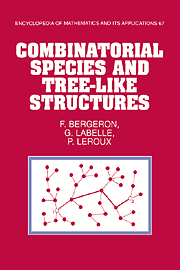
-
Select format
-
- Publisher:
- Cambridge University Press
- Publication date:
- 05 May 2013
- 13 November 1997
- ISBN:
- 9781107325913
- 9780521573238
- Dimensions:
- (234 x 156 mm)
- Weight & Pages:
- 0.8kg, 480 Pages
- Dimensions:
- Weight & Pages:
You may already have access via personal or institutional login- Series:
- Encyclopedia of Mathematics and its Applications (67)
Book description
The combinatorial theory of species, introduced by Joyal in 1980, provides a unified understanding of the use of generating functions for both labelled and unlabelled structures and as a tool for the specification and analysis of these structures. Of particular importance is their capacity to transform recursive definitions of tree-like structures into functional or differential equations, and vice versa. The goal of this book is to present the basic elements of the theory and to give a unified account of its developments and applications. It offers a modern introduction to the use of various generating functions, with applications to graphical enumeration, Polya theory and analysis of data structures in computer science, and to other areas such as special functions, functional equations, asymptotic analysis and differential equations. This book will be a valuable reference to graduate students and researchers in combinatorics, analysis, and theoretical computer science.
Reviews
‘This book can serve as an introduction to the subject; it will also be an extremely valuable reference book.’
Source: International Mathematical News
‘ … the first complete presentation in English of the combinatorial theory of species.’
Source: L’Enseignment Mathématique
‘ … a comprehensive account.’
Source: Zentralblatt für Mathematik und ihre Grenzgebiete
Contents
Metrics
Altmetric attention score
Full text views
Full text views help Loading metrics...
Loading metrics...
* Views captured on Cambridge Core between #date#. This data will be updated every 24 hours.
Usage data cannot currently be displayed.
Accessibility standard: Unknown
Why this information is here
This section outlines the accessibility features of this content - including support for screen readers, full keyboard navigation and high-contrast display options. This may not be relevant for you.
Accessibility Information
Accessibility compliance for the PDF of this book is currently unknown and may be updated in the future.


